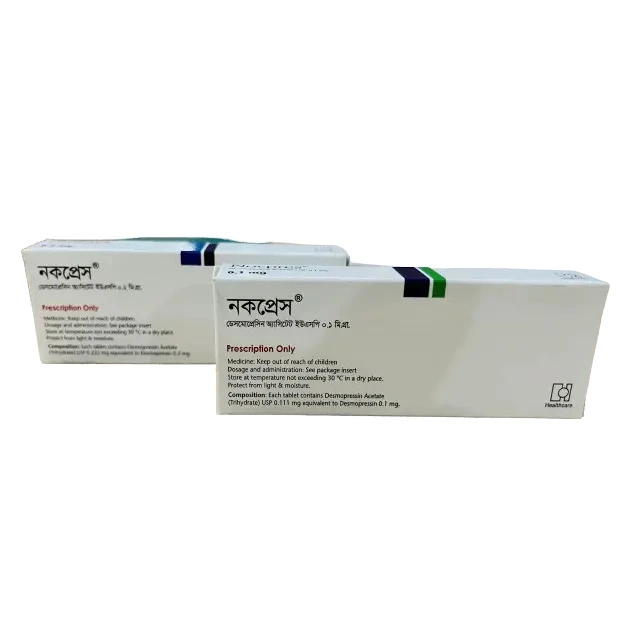Unit Price:
৳ 45.00
(1 x 10: ৳ 450.00)
Strip Price:
৳ 450.00
Also available as:
Indications
Nocpres film coated tablets are indicated as antidiuretic replacement therapy in the management of central diabetes insipidus and for the management of the temporary polyuria and polydipsia following head trauma or surgery in the pituitary region. Nocpres Tablets are ineffective for the treatment of nephrogenic diabetes insipidus.
Nocpres sublingual tablet is indicated for the treatment of-
Nocpres sublingual tablet is indicated for the treatment of-
- Primary Nocturnal Enuresis
- Nocturia and
- Central Diabetes Insipidus
Pharmacology
By mimicking the actions of endogenous ADH, desmopressin acts as a selective agonist of V2 receptors expressed in the renal collecting duct (CD) to increase water re-absorption and reduce urine production. Desmopressin has been shown to be more potent than ADH in increasing plasma levels of factor VIII activity in patients with hemophilia and von Willebrand's disease Type I. Desmopressin demonstrates markedly diminished pressor activity. Desmopressin administered intranasally has an antidiuretic effect about one-tenth that of an equivalent dose administered by injection.
Upon binding of desmopressin to V2 receptors in the basolateral membrane of the cells of the distal tubule and collecting ducts of the nephron, adenylyl cyclase is stimulated. The resulting intracellular cascades in the collecting duct lead to increased rate of insertion of water channels, called aquaporins, into the lumenal membrane and enhanced the permeability of the membrane to water.
Upon binding of desmopressin to V2 receptors in the basolateral membrane of the cells of the distal tubule and collecting ducts of the nephron, adenylyl cyclase is stimulated. The resulting intracellular cascades in the collecting duct lead to increased rate of insertion of water channels, called aquaporins, into the lumenal membrane and enhanced the permeability of the membrane to water.
Dosage & Administration
Sublingual tablet:
- Treatment of diabetes insipidus: Dosage is individual in diabetes insipidus but the total daily sublingual dose normally lies in the range of 120 micrograms to 720 micrograms. A suitable starting dose in adults and children is 60 micrograms three times daily, administered sublingually. This dosage regimen should then be adjusted in accordance with the patient's response. For the majority of patients, the maintenance dose is 60 micrograms to 120 micrograms sublingually three times daily.
- Post-hypophysectomy polyuria/polydipsia: The dose of Desmopressin Acetate Melt should be controlled by measurement of urine osmolality.
- Adults and Children: It is recommended that patients be started on doses of 0.05 mg (1/2 of the 0.1 mg tablet) two times a day and individually adjusted to their optimum therapeutic dose. Most patients in clinical trials found that the optimal dosage range is 0.1 mg to 0.8 mg daily, administered in divided doses. Each dose should be separately adjusted for an adequate diurnal rhythm of water turnover. Total daily dosage should be increased or decreased in the range of 0.1 mg to 1.2 mg divided into two or three daily doses as needed to obtain adequate antidiuresis.
- Geriatric Use: This drug is known to be substantially excreted by the kidney, and the risk of toxic reactions to this drug may be greater in patients with impaired renal function. Because elderly patients are more likely to have decreased renal function, care should be taken in dose selection, and it may be useful to monitor renal function.
Interaction
Although the pressor activity of Nocpres are very low compared to its antidiuretic activity, large doses of Nocpres Tablets should be used with other pressor agents only with careful patient monitoring. The concomitant administration of drugs that may increase the risk of water intoxication with hyponatremia, (e.g. tricyclic antidepressants, selective serotonin re-uptake inqibitors, chlorpromazine, opiate analgesics, NSAIDs, lamotrigine and carbamazepine) should be performed with caution.
Contraindications
Desmopressin Acetate Tablets are contraindicated in individuals with known hypersensitivity to desmopressin acetate or to any of the components of Desmopressin Acetate Tablets. Desmopressin Acetate Tablets are contraindicated in patients with moderate to severe renal impairment (defined as a creatinine clearance below 50 mL/min). Desmopressin Acetate Tablets are contraindicated in patients with hyponatremia or a history of hyponatremia.
Side Effects
Infrequently, large doses of the intranasal formulations of Nocpres Tablets and Nocpres Injection have produced transient headache, nausea, flushing and mild abdominal cramps. These symptoms have disappeared with reduction in dosage.
Pregnancy & Lactation
There have been no controlled studies in nursing mothers. Caution should be exercised when desmopressin acetate is administered to nursing mothers.
Precautions & Warnings
Very rare cases of hyponatremia have been reported from world-wide postmarketing experience in patients treated with Nocpres Tablets. Nocpres Tablets are a potent antidiuretic which, when administered, may lead to water intoxication and hyponatremia. Unless properly diagnosed and treated hyponatremia can be fatal. Therefore, fluid restriction is recommended and should be discussed with he patient and/or guardian. Careful medical supervision is required.
Intranasal formulations of Nocpres at high doses and Nocpres Injection have infrequently produced a slight elevation of blood pressure which disappears with a reduction of dosage. Although this effect has not been observed when single oral doses up to 0.6 mg have been administered, the drug should be used with caution in patients with coronary artery insufficiency and/or hypertensive cardiovascular disease, because of a possible rise in blood pressure.
Intranasal formulations of Nocpres at high doses and Nocpres Injection have infrequently produced a slight elevation of blood pressure which disappears with a reduction of dosage. Although this effect has not been observed when single oral doses up to 0.6 mg have been administered, the drug should be used with caution in patients with coronary artery insufficiency and/or hypertensive cardiovascular disease, because of a possible rise in blood pressure.
Therapeutic Class
Synthetic analogue of ADH
Storage Conditions
Store at temperature not exceeding 30°C in a dry place. Protect from light and moisture.


